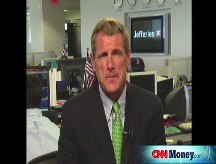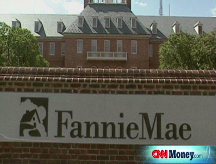Banks batter Wall Street
Fears that more banks could follow IndyMac's failure counter relief about the government plan to bolster Fannie Mae and Freddie Mac.

NEW YORK (CNNMoney.com) -- The financial sector tumbled Monday, dragging down the broader market, as the IndyMac bank failure countered relief that the government is helping Fannie Mae and Freddie Mac.
The Dow Jones industrial average (INDU) lost 0.4% and closed at its lowest point since July 21, 2006. Strength in big consumer names such as Coca-Cola (KO, Fortune 500) and McDonald's (MCD, Fortune 500) tempered the impact of weakness in financials.
The Standard & Poor's 500 (SPX) index slipped 0.9% and ended at its lowest point since June 2006. The tech-heavy Nasdaq composite (COMP) shed 1.2% and still held above its March lows.
An early rally dissolved as relief about Fannie (FNM, Fortune 500) and Freddie (FRE, Fortune 500) gave way to concerns that more banks would go the way of IndyMac (IMB) - which was taken over by the federal government late Friday.
"Depositors may not be making a run on the banks, but investors sure are," said Jeff Kleintop, chief market strategist at LPL Financial Services.
He said that with the whole financial sector down sharply Monday, that sector is largely responsible for the market weakness.
"Banks are getting hurt on concerns that there could be one or more IndyMac's out there," Kleintop said.
Stocks trimmed some losses near the close, before resuming the downward direction. All three major stock gauges are currently in a bear market, defined as a decline of at least 20% off the cyclical highs.
Tuesday brings earnings from Dow component Johnson & Johnson (JNJ, Fortune 500) before the start of trade and Intel (INTC, Fortune 500) after the close. Dow component General Motors (GM, Fortune 500) is expected to annouce more restructuring moves Tuesday in response to slowing U.S. sales.
Tuesday is a heavy day for economic news, with reports due before the start of trade on retail sales, wholesale inflation and manufacturing in the N.Y. area. After the start of trade, a report is due on business inventories.
The IndyMac effect. The mortgage lender reopened Monday under Federal management and a new name, IndyMac Federal Bank. (Full story)
National City (NCC, Fortune 500) and Washington Mutual (WM, Fortune 500) were among the companies that got dragged down Monday on fears that they could be next after IndyMac, although analysts say neither bank is on the brink of collapse. Zions Bancorp (ZION) was another big decliner. (Full story).
WaMu slid nearly 35% after a Lehman Brothers note said it may need to substantially boost its reserves over the rest of the year to cover home loan losses. Lehman expects the company to post $26 billion in cumulative losses when it reports results next Tuesday - with $21 billion of that from home loans. (Full story)
"There's still a lot of nervousness and skittishness out there, with a large population of investors unwilling to commit cash," said Matt King, chief investment officer at Bell Investment Advisors.
Stocks tumbled last week, but found a little traction late Friday on talk that the Federal Reserve would open up its discount window to Fannie Mae and Freddie Mac, staving off a potential failure of the two mortgage firms.
That talk came to fruition Sunday when the Treasury Department and the Fed announced a plan to support the two mortgage financing firms, which are responsible for about half the nation's home-loan debt. (Full story)
Enthusiasm for the plan gave both Fannie and Freddie shares and the broader stock market an early pop, which fizzled as jitters about the health of financial firms overall remained front and center.
"The market is digesting what I think are reassuring steps to restore the confidence in Freddie Mac and Fannie Mae," said Jim Hardesty, chief investment officer at Hardesty Capital Management. "But it may take several days or weeks for the market to see its way clear on this."
Mortgage rescue plan. The government's plan would give Freddie and Fannie, which hold or guarantee nearly $5 trillion worth of mortgages, a bigger line of credit with the Treasury - and allow the Treasury to buy stock in the firms.
The companies can also go to the Federal Reserve Bank of New York for funds, giving them the same access that commercial banks and Wall Street firms have.
Freddie (FRE, Fortune 500) shares dipped and Fannie (FNM, Fortune 500) shares declined, giving up early gains. Both stocks lost nearly half their value last week. (Full story)
Freddie Mac's sale of $3 billion in short-term debt garnered better-than-expected prices, suggesting the government's rescue plan has given investors some reassurance.
Fears about the possible collapse of Freddie and Fannie have shaken markets already battered by the nearly year-old credit market crisis. Should the companies fall apart, that would cause more losses to other companies that have large holdings of mortgage-backed securities.
The Federal Reserve approved new mortgage lending rules Monday that are designed to attack shady mortgage practices. (Full story)
Bank stocks fell Monday, including Dow components American Express (AXP, Fortune 500), Bank of America (BAC, Fortune 500) and Citigroup (C, Fortune 500).
Citigroup is due to release results Friday, while JP Morgan Chase (JPM, Fortune 500) and Merrill Lynch (MER, Fortune 500) are scheduled Thursday. A number of regional banks also report quarterly results this week. (Full story).
Fuel prices. U.S. light crude oil for August delivery settled up 10 cents to $145.18 a barrel on the New York Mercantile Exchange. (Full story).
The national average price for a gallon of regular unleaded gas rose Monday to an all-time high of $4.109 from $4.096 Friday, according to AAA. (Full story).
Merger news. Over the weekend, Anheuser-Busch agreed to InBev's improved $52 billion takeover offer. The combination of the maker of Bud beer and the Belgian beer company will create the world's largest brewer.
Also this weekend, Yahoo (YHOO, Fortune 500) spurned an offer from Microsoft (MSFT, Fortune 500) and investor Carl Icahn to buy the company's Internet search unit
In other Microsoft news, the company said late Friday that it was cutting the price of its Xbox 360 gaming console and introducing a new model with a bigger hard drive.
Early Monday, Waste Management (WMI, Fortune 500) offered to buy Republic Services (RSG) for $34 per share in cash, or around $6.2 billion.
Among other movers, Apple (AAPL, Fortune 500) shares gained modestly after the company said it sold one million of the new 3G iPhones in the first weekend.
Market breadth was negative. On the New York Stock Exchange, losers topped winners by almost 3 to 1 on volume of 1.41 billion shares. On the Nasdaq, decliners topped advancers by over two to one on volume of 2.07 billion shares.
Other markets. In currency trading, the dollar gained versus the euro and slipped against the yen.
In the bond market, Treasury prices rallied, lowering the yield on the benchmark 10-year note to 3.86% from 3.95% late Friday. Bond prices and yields move in opposite directions.
COMEX gold for August delivery rose $13.10 to settle at $973.70 an ounce. ![]()





